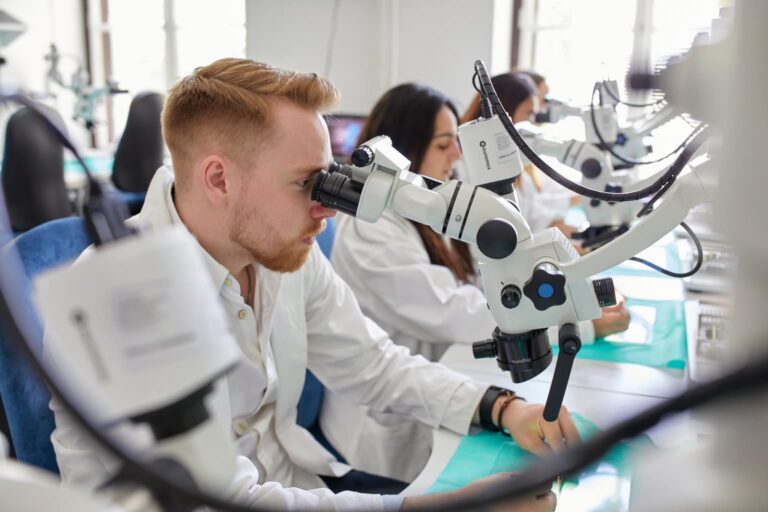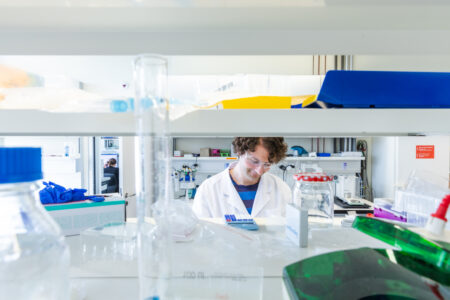
The benefits of doing a degree in pharmaceutical science are endless. The pharmaceutical industry is witnessing significant growth, resulting in an increased demand for professionals with specialised knowledge. Notably, the job market for medical scientists is expected to grow by 11% from 2023 to 2033, which is much faster than the average for other jobs.
Another benefit of this field is the improved job prospects and earning potential. According to Glassdoor, pharmaceutical scientists can expect a total pay ranging from US$173,000 to US$323,000 per year.
But it’s even better if you take your studies abroad. You’ll get a fresh perspective on the industry, exploring how different countries handle regulations, policies, and drug discovery, development, and distribution practices.
Consider Europe as a case in point. Europe is a world leader in pharmaceutical research and development, ranking #3 worldwide for launching new active substances. In 2023, it invested US$54 million in research and development, creating jobs for 900,000 people. And the momentum doesn’t stop there. Big names like AstraZeneca and Johnson & Johnson from the US partnered with European startups in 2024 to fuel even more growth and innovation.
Here are four institutions in Europe with pharmaceutical science programmes that lay the basics for an array of career prospects.

Students who successfully finish the programme earn the title Doctor Pharmaciae (pharmacist, PharmD.). Source: University of Szeged
University of Szeged
If you aspire to become a pharmacist, you’ll get the best training at a university that combines support with high-quality education. At the University of Szeged’s Faculty of Pharmacy, ranked #11 in Eastern Europe, you’ll find just that – and so much more.
Located in the “City of Sunshine,” Hungary’s second-oldest pharmacy faculty is famous for fusing the old with the new and innovative. Here, a blend of qualified instructors (95% hold a PhD) and a practice-oriented curriculum come together to help you grow professionally and prepare for one of the most impactful professions today.
In the five-year Doctor of Pharmacy programme, you will first learn the basic sciences before progressing into general and specialised pharmaceutical education, covering everything from medicinal plant studies to nano- and biotechnology. The faculty is part of several international research partnerships, which means your coursework reflects the latest scientific results.
Besides mastering theory, you will build confidence through hands-on experiences that focus on natural, medical and pharmaceutical sciences. As the cohort is small, you get to make the most of these learning experiences. They’re more personal and effective, preparing you for real-world challenges.
And if you’re dreaming of a global career, you’re in luck as a degree from the University of Szeged opens doors to a variety of rewarding professional opportunities both within and beyond the EU. In fact, graduates from Szeged are in high demand, often landing jobs in community pharmacies, hospitals or clinics, clinical investigations, drug development, scientific translations and interpretations and more within three months of graduation.

All students participate in research projects as part of their studies, exploring diverse topics, including neuroscience, drug delivery systems, and medicinal chemistry. Source: Trinity College Dublin
Trinity College Dublin
There are many reasons why students worldwide choose to study pharmaceutical science with the School of Pharmacy and Pharmaceutical Sciences at Trinity College Dublin. Established in 1977, the school, the oldest academic pharmaceutical institution in Ireland, is known for its continuous learning, innovative teaching, and alignment with best practices, producing both staff and students who contribute to society as world-class leaders.
With 300 undergraduate and 100 postgraduate students, supported by 50 staff and post-doctoral researchers, the school offers a wide range of pharmaceutical science programmes. Undergraduates can join the five-year pharmacy (integrated) programme, with lectures, laboratory classes and tutorials in physiology, advanced pharmaceutics, and industrial pharmacy. For postgraduate students, there are programmes like the M.Sc./Postgraduate Diploma in Pharmaceutical Sciences, M.Sc. in Hospital Pharmacy, and many more.
All programmes are taught by leading researchers, including the co-inventor of the Nicotine Patch. As a result, the college is ranked well. According to QS World University Ranking 2025, Trinity College Dublin is ranked the best university in Ireland and #26 globally for Pharmacy and Pharmacology. And it continues to set the standard for pharmacy education, combining research and teaching excellence to produce future pharmaceutical industry leaders who heal with quality and compassion.

In line with its motto, “Initiation, Excellence, Evolution”, you’ll receive a world-class education that prioritises patient care and prepares you for a successful career. Source: Carol Davila University of Medicine and Pharmacy
Carol Davila University of Medicine and Pharmacy
Founded in 1857 by Dr. Carol Davila, a Romanian physician, Carol Davila University of Medicine and Pharmacy (UMFCD) is dedicated to nurturing the next generation of pharmaceutical professionals.
Its ISO 9001-certified Faculty of Pharmacy offers a five-year Bachelor’s degree consisting of a Romanian Teaching Module and two departments with 20 disciplines, for example, organic chemistry, drug control, toxicology and biochemistry. A PhD degree and residency programmes are available as well if you are interested in specialising in your field.
Other than developing a solid foundation in various pharmaceutical disciplines, you will learn about patient-centred care. UMFCD is affiliated with over 37 clinical teaching hospitals where you can put theory to practice. Plus, its facilities create a conducive learning environment for students. For example, from 3D printing to medical simulation, the Innovation and e-Health Centre enables you to understand medical procedures and concepts better.
On the other hand, if you want to take a break from studying, you can dive into UMFCD’s sports facilities or explore Bucharest’s cultural scene. Often called the “new Berlin” or the “little Paris of the East,” the city is not only lively but also affordable, the perfect place to relax, meet new friends, and make lifelong memories.

At Uppsala University, students from diverse backgrounds are empowered to create a positive impact on the world. Source: Uppsala University
exterior
Uppsala University
Uppsala University – the first Nordic university – is one of Sweden’s most internationally prominent institutions of academic education, research and scholarship. Founded in 1477, the university has grown into one of the best research universities in the world, with 50,000 students and close to 5,000 researchers.
The university is divided into three disciplinary domains: humanities and social sciences, medicine and pharmacy, and science and technology. Each domain is committed to conducting high-quality, impactful education and research that aims to make a long-term difference in society. Among them, the Department of Pharmacy is especially notable, ranking #24 globally in Pharmacy and Pharmacology.
The department operates at the Biomedical Centre (BMC) in Uppsala and consists of 13 research groups and two research platforms, forming part of Sweden’s only Pharmaceutical Faculty. It excels in teaching, research, and societal collaboration on drug development and use, offering various advanced courses, including the Master’s Programme in Biopharmaceuticals, Drug Discovery and Development, and Pharmaceutical Modelling. Courses here are regularly updated with the latest research findings and are delivered by experienced professors, lecturers, and researchers, as well as guest speakers from the pharmaceutical industry and regulatory bodies, ensuring a comprehensive and cutting-edge education.
*Some of the institutions featured in this article are commercial partners of Study International










